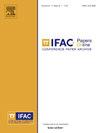Robust real-time model parameter extraction in inductive spectroscopy based on Artificial Neural Networks
Q3 Engineering
引用次数: 0
Abstract
Impedance spectrum modelling requires parameter extraction by solving the corresponding inverse identification problem, for which both gradient-based and stochastic methods have been proposed. Stochastic methods are more robust and have a lower risk of getting trapped in local minima but need a long calculation time. In this study, we examine the implementation of artificial neural networks (ANNs) in solving inverse identification problems in inductance spectroscopy, contrasting their performance with robust stochastic methods. In order to overcome the shortage of a representative amount of experimental data, we propose to use the analytically based model to generate accurate enough labelled data for the training process of the ANN. The artificial data have been structured in a homogeneous and tightly spaced grid in the parameter space, thus supporting the model’s generalisation and suppressing overfitting. ANNs with varied degrees of complexity have been investigated by modifying the number of neurons and evaluated by training and comparison with stochastic parameter extraction methods. The investigation concludes that, for the presented application in inductive spectroscopy, the neural networks can provide comparable parameter extraction results with a relative deviation of 0.03 % of the parameter value and a significant reduction in runtime from 60 s to 8 ms.
求助全文
约1分钟内获得全文
求助全文
来源期刊

IFAC-PapersOnLine
Engineering-Control and Systems Engineering
CiteScore
1.70
自引率
0.00%
发文量
1122
期刊介绍:
All papers from IFAC meetings are published, in partnership with Elsevier, the IFAC Publisher, in theIFAC-PapersOnLine proceedings series hosted at the ScienceDirect web service. This series includes papers previously published in the IFAC website.The main features of the IFAC-PapersOnLine series are: -Online archive including papers from IFAC Symposia, Congresses, Conferences, and most Workshops. -All papers accepted at the meeting are published in PDF format - searchable and citable. -All papers published on the web site can be cited using the IFAC PapersOnLine ISSN and the individual paper DOI (Digital Object Identifier). The site is Open Access in nature - no charge is made to individuals for reading or downloading. Copyright of all papers belongs to IFAC and must be referenced if derivative journal papers are produced from the conference papers. All papers published in IFAC-PapersOnLine have undergone a peer review selection process according to the IFAC rules.
 求助内容:
求助内容: 应助结果提醒方式:
应助结果提醒方式:


